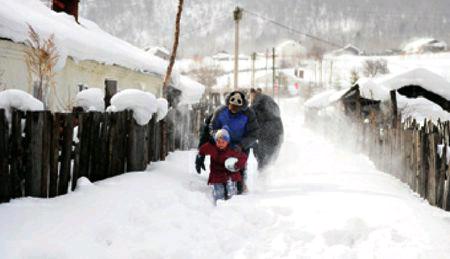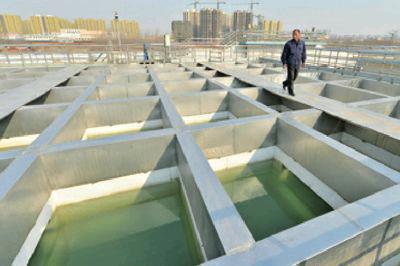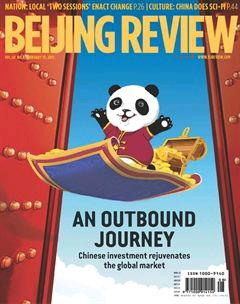Snow White
Tourists play in the snow at Xuecun Village, Heilongjiang Province, on February 7. Part of a tree farm under the Chaihe Forestry Bureau, the village sees snow for seven months every year, with the annual average depth of snowfall reaching 2 meters. It is now a major destination for snow lovers from all over China.
Lunar Mission Tests
The service module of Chinas unmanned lunar orbiter has finished tests of orbiting technologies needed for a future sampling mission on the moon.
The orbiter conducted three tests between February 6 and 7 to modulate the speed, height and orbit in a simulative moon sampling mission, according to a statement of the State Administration of Science, Technology and Industry for National Defense on February 8.
The technology adopted is likely to be used in the countrys next lunar probe mission, Change-5.
The Change-5 probe, expected to launch in 2017, will be tasked with landing on the moon, collecting samples and returning to Earth.
The current lunar orbiter blasted off on October 24, 2014. Its return capsule made it safely back to Earth last November after circling the moon during an eight-day mission while the service module has remained in orbit to undertake more scientific experiments and equipment test.
Username Management
The Cyberspace Administration of China has issued a regulation banning the use of malicious content, such as avatars and account handles, across all Internet services.
The 10-clause regulation, which will come into effect on March 1, stipulates that avatars and account handles should not include information that violates the Constitution or the countrys laws, subverts state power, undermines national security and sovereignty, or is deemed to be spreading rumors.
Malicious content includes the promotion of cults and the dissemination of pornography or extremism, among others, according to the regulation.
Administrative Reform
The Chinese Government published measures on February 4 that will speed up the administrative approval process.
A recent document of the State Council, Chinas cabinet, lists 10 ways to set time limits for the process and improve transparency.
Decisions on approval must be announced within a limited time and may not be prolonged for any reasons, according to the document. There should be “green passages” to give priority to projects supported by the government.
In the past two years, 798 administrative approval requirements have been canceled or delegated to local governments. However, delays, redundant procedures and opacity remain common.
The document requires authorities to voluntarily publicize all information related to approvals, as long as it does not involve state or commercial secrets or breach personal privacy.
Authorities should receive applicants at a one-stop service window or handle the work online, says the document.
Childrens Health
Chinas infant mortality rate dropped to 9.5 per thousand in 2013 thanks to an improved healthcare system, according to data from the National Bureau of Statistics (NBS).
The figure has continued to decline in recent years compared to 12.1 per thousand in 2011 and 29.2 per thousand in 2002, said the NBS.
The mortality rate of children under 5 has also continued to drop to 12 per thousand, down from 34.9 per thousand in 2002 and 15.6 per thousand in 2011.
The NBS data also revealed that both the infant mortality rate and the mortality rate of children under 5 were higher in rural areas than in cities in 2013, reaching 11.3 per thousand and 14.5 per thousand, respectively.
Online Population
Chinas netizen population, the worlds largest, had reached 649 million by the end of 2014, driven by the popularity of Internet surfing on smartphones.
The number of people accessing the Internet from mobile devices totaled 557 million at the end of last year, up 56.72 million year on year and accounting for 85.8 percent of the total online population, according to the China Internet Network Information Center (CNNIC).
According to the CNNIC, there were 31.17 million new Internet users in China last year, a relatively small increase compared to the 53.58 million users added in 2013.
Liu Bing, the centers deputy director, attributed the decline in new netizens to the widened digital divide between rural and urban areas.
In 2014, Chinese netizens spent an average of 26.1 hours online per week, just over an hour more than in 2013, according to the report.
Undersea Discovery
Chinas deep-submergence vehicle Jiaolong has discovered a huge hydrothermal vent 20 meters tall and 2 meters wide in a hydrothermal area of southwestern Indian Ocean.
“Deep sea vents as huge as this one are rarely seen,” said Shao Zongze, a researcher with the Third Institute of Oceanography of the State Oceanic Administration who was aboard the sub.
Hydrothermal vents often contain seabed deposits of copper, zinc and precious metals such as gold and silver. Those metals form sulfides after undergoing chemical reactions in high heat and high pressure around the vent, eventually settling and solidifying into a characteristic “chimney.”
Jiaolong found hints of a new active chimney vent on February 2 north of a hydrothermal area called Dragon Flag, which was the first hydrothermal area Chinese scientists discovered in 2007, according to Shao.
Jiaolong is on a 120-day expedition in southwest Indian Ocean.
No Place Like It
Dai Zhuhua, a migrant worker in south Chinas Guangdong Province, and his wife show papers printed with Chinese characters meaning “return home” on a train bound for their hometown in neighboring Guangxi Zhuang Autonomous Region on February 7.
China kicked off its largest seasonal travel rush on February 4 with an expected 2.8 billion trips during the 40-day Lunar New Year holiday season.
Taking place every year 14 days ahead of the Spring Festival, February 19 this year, the travel spree is considered the worlds largest human migration, with hundreds of millions of Chinese people traveling home to reunite with their families.
This years number of trips would be 3.4-percent higher than that of last year, according to an official estimation.
Returning to Balance
Children interact with their teacher at a kindergarten in Xi Ujimqin Banner, Inner Mongolia Autonomous Region.
Chinas high gender imbalance has continued to decline, with 115.88 baby boys born in 2014 for every 100 girls, the sixth successive decrease.
A normal sex ratio at birth is commonly between 103 and 107 baby boys for every 100 girls. China has had a sexual disparity of more than 110 for a number of years, according to official statistics.
The ratio for 2014 is the lowest level since 2008, when there were 120.56 baby boys for every 100 girls.
UNESCO Bid
Shanghai has planned to apply for a local neighborhood that sheltered Jewish refugees during World War II(WWII) to be inscribed on the Memory of the World Register of the UN Educational, Scientific and Cultural Organization (UNESCO), Xinhua News Agency reported.
Shanghai accommodated about 20,000 Jewish refugees fleeing from Nazi persecution during WWII. Many of them lived in the Tilanqiao area of Shanghais Hongkou District.
The city has completed the collation of the refugee list, data bank; and of literary, video and audio material, said Chen Jian, Curator of the Shanghai Jewish Refugees Museum that is working with the Hongkou District Government on the application.
Liquidity Injection
Chinas central bank on February 5 lowered the reserve requirement ratio (RRR), the minimum level of reserves banks must hold, by 0.5 percentage points.
This is the first universal RRR cut since May 2012.
The Peoples Bank of China(PBC) also increased support to some targeted areas, cutting the RRR by extra 0.5 percentage points for qualified city and rural commercial banks engaged in proportionate lending to small firms, the farming sector and major water projects. The Agricultural Development Bank of China, the sole policy lender for agriculture, earned an RRR reduction of 4 percentage points. This is the first time that the central bank has tried a universal RRR cut and a targeted one.
Currently, big banks must hold 20 percent of their deposits in reserve, while the ratio for small and mediumsized banks is 16.5 percent.
The move comes days after the January PMI (purchasing managers index), a main gauge of manufacturing activity, fell below 50 for the first time since October 2012, a sign of a weakening economy.
The PBC said that it would “continue a prudent monetary policy, striking a balance between tight and loose, guiding monetary credit and private financing to grow steadily and moderately, to promote a healthy and steady economy.”
According to estimates by U.S. investment bank J.P. Morgan and some Chinese institutions, the RRR cut could put 650 billion yuan ($104 billion) into the real economy.
Foreign Trade Decline
Chinas foreign trade tumbled in January as major data experienced a routine decline ahead of the Spring Festival holiday, February 19 to 24 this year.
In January, Chinas exports dropped 1.4 percent to $200.26 billion, and imports slumped 14.5 percent to $140.23 billion, making the trade surplus expand to $60.03 billion, according to the General Administration of Customs(GAC). Total foreign trade tumbled 7.2 percent year on year to $340.48 billion.
The GAC said the Spring Festival impacts foreign trade data at the beginning of every year. Chinese Lunar New Year, or the Spring Festival, is an important time for family reunions in China.
“The trade data always turn out discouraging at every years beginning because of the Lunar New Year,” Liu Xuezhi, a financial researcher with the Bank of Communications, explained.“The data thereafter can reflect the real situation of Chinas foreign trade.”
He said withering exports, especially labor-intensive industries, reveal the weakening advantage in formerly dominant areas, including machinery, garments, textiles, shoes, toys, furniture and plastics—exports that all saw remarkable drops in January.
He attributed the sharp decrease in imports to lower prices for bulk commodities, ongoing industrial upgrades and reduction of overcapacity.
Clear and Clean
A staff member of a water supply company examines reaction tanks in Shijiazhuang, capital of north Chinas Hebei Province. On February 8, water from the south reached the city through the South-to-North Water Diversion Project.
Medical Insurance
Commercial insurers are expected to play a more important role in providing medical insurance to a rapidly aging population in China, a top health official said on February 6.
The government will encourage the development of various types of commercial insurance to increase peoples ability to deal with risks posed by major diseases, Ma Xiaowei, Vice Minister of National Health and Family Planning Commission (NHFPC), said at a news conference.
“The number of old people in China is increasing fast, and this is putting a lot of pressure on its medical insurance system,” Ma said. “A new survey shows the proportion of people aged 65 or above who go to a hospital for treatment is more than double that of young people.”
According to the NHFPC, the number of people aged 60 or above reached 202 million in China in 2013, accounting for about 15 percent of the total population. In the past two decades, the Chinese Government has established a vast medical insurance network, covering 1.3 billion people, Ma said.
Sun Ting, an analyst from Shenyin& Wanguo Securities, said commercial health insurance represents a very small portion of the whole market and is mainly targeted at high-income groups to provide them with customized services.
“The development of commercial health insurance needs policy support,”she said.
China-Italy Link
Chinas Hainan Airline will begin direct flights from southwest Chinas Chongqing to Rome from April 27, the Consulate General of Italy in Chongqing said on February 8.
The flight will cut the travel time between the two cities to about 13 hours. The route will run every Monday and Friday, departing from Chongqing at 1:30 a.m. and arriving in Rome at 7:50 a.m. The returning flight departs from Rome at 12:50 p.m. and lands in Chongqing at 5:45 a.m. the next day.
Meanwhile, the new visa center of the consulate will begin accepting Italian visa applications on February 16 from Chongqing, Sichuan, Yunnan, Guizhou, Gansu, Shaanxi, Hubei, Qinghai provinces and Ningxia Hui Autonomous Region, the consulate announced.
Applicants will not have to travel to Beijing to apply, and applications will be processed within two days with a fee of 60 euro ($68).
Chinas China
Goat-themed porcelain plates are produced in a porcelain company in Handan, north Chinas Hebei Province, on February 7. As the Year of the Goat approaches, these porcelain plates are in high demand.
Alibabas Ambition
Chinas Alibaba Group Holding Ltd. is taking a $590 million stake in domestic smartphone maker Meizu as the ecommerce giant tests ways to expand its mobile operating system in the handset market.
On February 9, Alibaba said it will buy an unspecified minority stake in smartphone maker Meizu Technology Co.
The deal is designed to help Alibaba push its mobile operating system within China through Meizus handsets. In return, Guangdong-based Meizu will gain access to Alibabas e-commerce sales channels and other resources, the companies said in a joint statement.
Dwarfed by rivals like Apple, Samsung, Xiaomi and Lenovo, Meizus slice of Chinas smartphone market lacks appeal.
Meizu has pumped up shipments from a few hundred thousand in previous years to under 2 million in the last three months of 2014, but it still had less than 2 percent of Chinas smartphone market share in that quarter, said Nicole Peng, a Shanghai-based analyst with data research firm Canalys.
Dispute Settled
The Chinese affiliates of the “big four”global accounting firms agreed to pay a total of $2 million to settle a longrunning dispute with the U.S. Securities and Exchange Commission (SEC) over their reluctance to turn over documents related to investigations of potential fraud, the SEC announced on February 6.
The Chinese-based units of PricewaterhouseCoopers, Deloitte Touche Tohmatsu, KPMG and Ernst & Young each agreed to pay $500,000 and take specific steps to provide documents to SEC investigators over the next four years, the SEC said in a statement.
The settlement follows a ruling by the SEC last year recommending the suspension of the Chinese affiliates of the “big four” for six months, which could have affected hundreds of Chinese companies listed in the United States and U.S. multinational companies operating in China.
“The settlement provides a path forward for obtaining productions and enhanced future cooperation from the ‘big four firms,” said Antonia Chion, Associate Director of the SECs Enforcement Division.
As part of the settlement, the Chinese affiliates admitted that they did not produce documents before the SEC started administrative proceedings against them in 2012, but they didnt admit or deny other findings in the order, the SEC said.

